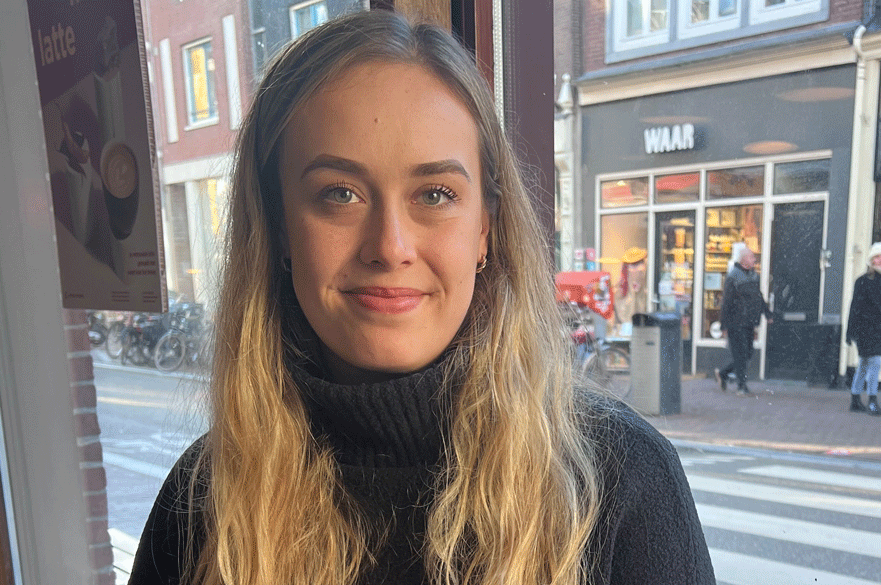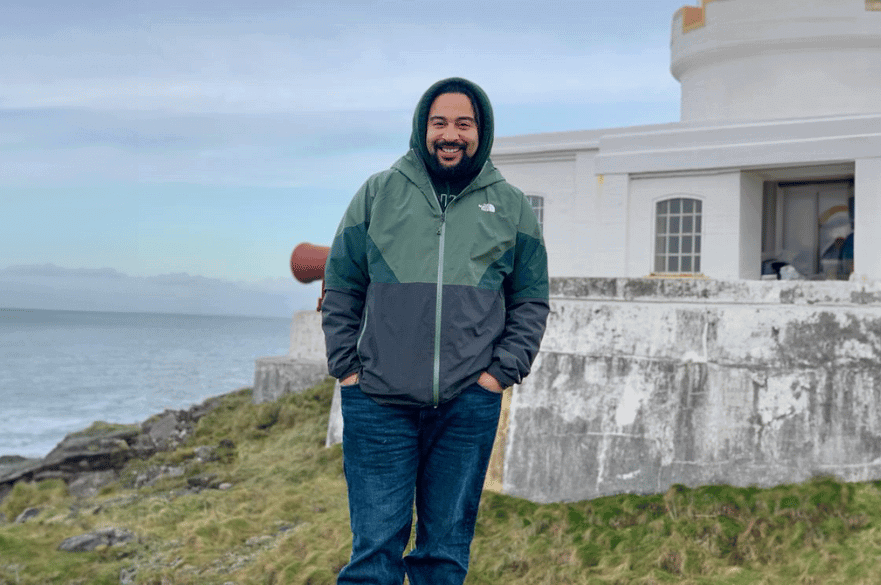
When I was sat in lectures listening to ‘people, planet, profit’, I never thought it would be so important, but I find myself using this daily in my current role.
More about Chloe
Chloe graduated in 2022 and is now an Environment, Health and Safety Advisor. We caught up with her to speak about her career and her NTU memories.
What are some of the most important things you learned?
The Environmental Science course at NTU provided me with a baseline knowledge and understanding of the subject, which I could then build upon and apply in my working life. There is such a wide variety of content throughout the modules so you find yourself referring back to learnings from all different aspects of the course throughout your career.
Global environmental issues, law and policy and sustainability are common themes and, in my opinion, they are invaluable when it comes to demonstrating your understanding of the subject, decision making and promoting important discussions in your career in environmental science. When I was sat in lectures listening to ‘people, planet, profit’, I never thought it would be so important, but I find myself using this daily in my current role.
I took the marine and freshwater ecology module in final year because I thought it would be interesting, not because I thought it would further me in my career, but it actually assisted me in securing my first job. In my first role, I had to manage the effluent treatment process of waste water from a processing facility, utilising a series of reed beds to treat the water before discharging to river. I had to carry out regular sampling to demonstrate compliance, make informed decisions based on the results and ultimately manage the process in line with our environmental permit. The vast majority of these skills were obtained during my time at NTU.
What did you learn outside of your lectures?
I took advantage of the sandwich course and spent a year in industry as an environmental intern at an aerospace manufacturing company in Bristol. I wholeheartedly recommend an internship to anyone on this course because it gives you opportunity to develop your soft skills, you make plenty of industry contacts and it looks really good on your CV! Being a graduate with working skills sets you apart from other graduates who have not done a placement and my time at Airbus definitely assisted me in securing a job.
What does your current day involve?
My current role as Environment, Health and Safety Officer for BDRThermea UK&I is very varied. My role now is project driven, implementing strategies to reduce environmental impact. My main area of focus is waste management and I am currently concentrating on waste monitoring and implementing projects to drive waste up the waste hierarchy. I recently attended a conference in Amsterdam to collaborate on a returnable packaging project and a conference in London to learn more about plastic waste.
In my previous role as Environment Officer for a processing facility, my day was relatively structured because I had to comply with a stringent environmental permit. This meant that wetlands monitoring had to be carried out according to set parameters daily and water testing on a weekly, monthly and quarterly basis. As well as this, I had to implement ISO14001 and ISO50001 standards which involved monitoring, measuring and reporting at regular intervals.
What attracted you to this field of work?
It was my A-Level Environmental Science teacher who persuaded me to study the course at university. I enjoyed the topic but I was not aware of all the different career paths that are available. In my second year when it came to applying for internships, I was immediately drawn to the transportation sector because it is fast-growing and hard to decarbonise. I thoroughly enjoyed my time at Airbus and it may be the case that I pursue a career in aerospace at a later date however due to personal reasons I wanted to work closer to home.
I jumped at the opportunity to work for a water and space heating manufacturer because sufficient heating and hot water is vital in all UK homes. It contributes to a vast amount of emissions and therefore stakeholders are collaborating on exciting projects with the aim of reducing environmental impact. At the moment, my job role very much focuses around the manufacturing stage of the process however as I develop I would like to move into the operational phase and become part of the solution for decarbonising UK homes.
What challenges have you faced?
When I first graduated, we were still very much in the midst of COVID and I really struggled to find a job within the field. At first, I was set on working in the aerospace industry then, as I applied for more and more jobs, it quickly became apparent that I would struggle to secure a position in environment! I received a call from a recruiter about a position as Environment Officer at a processing facility and although this was not my chosen field, I took the position because I thought it would give me valuable experience. I worked at the processing facility for over a year and although it was challenging, I gained so much valuable experience which has helped me a great deal in my current position. It was a stepping stone to lead me into a long-term position and I believe that I would not have secured my current role without this experience.
What have been the highlights of your career so far?
In my current position, there are plenty of opportunities to travel, meet new people and share learnings with stakeholders from lots of different industries. I believe that if we want to make a genuine positive environmental impact we have to collaborate and businesses need to share best practice and put competition aside. I really enjoy attending conferences and workshopping events to engage and learn with people and see how other companies’ are working towards their environmental objectives. Some of my highlights have been at these events.
Finally, is there anything else you’d like to share with our alumni community?
A piece of advice from me and something that all my work colleagues would relate to me is ‘how do you eat an elephant?’. During my placement, I would often get stressed dealing with lots of different projects but my manager always used to ask me how to eat an elephant. The reply was ‘split it into bitesize pieces’. It’s stupid but it’s something that has always stuck with me and whenever I feel overwhelmed I always go back to it.
Still need help?
-

STUDENT PROFILE
Ajay Tegala
Ecology and ConservationUnited Kingdom
https://www.ntu.ac.uk/study-and-courses/courses/our-students-stories/animal-rural-environmental-sciences/ajay-tegala
-

STUDENT PROFILE
Ajay Uniyal
Food Science and TechnologyIndia
https://www.ntu.ac.uk/study-and-courses/courses/our-students-stories/animal-rural-environmental-sciences/ajay-uniyal
-

STUDENT PROFILE
Bejohn Quigley
Ecology and ConservationUnited Kingdom
https://www.ntu.ac.uk/study-and-courses/courses/our-students-stories/animal-rural-environmental-sciences/bejohn-quigley